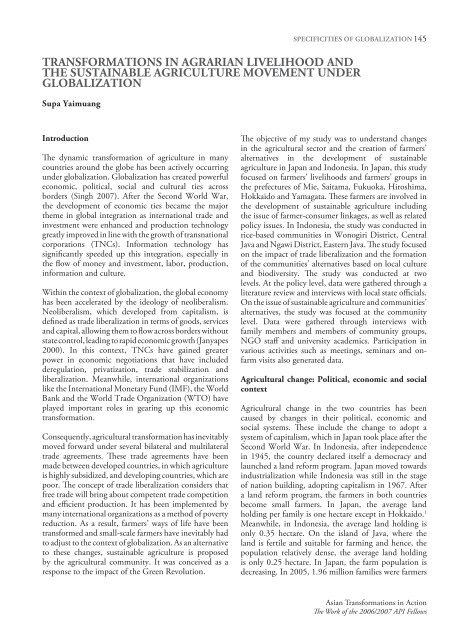Asian Transformations in Action - Api-fellowships.org
Asian Transformations in Action - Api-fellowships.org
Asian Transformations in Action - Api-fellowships.org
You also want an ePaper? Increase the reach of your titles
YUMPU automatically turns print PDFs into web optimized ePapers that Google loves.
SPECIFICITIES OF GLOBALIZATION 145TRANSFORMATIONS IN AGRARIAN LIVELIHOOD ANDTHE SUSTAINABLE AGRICULTURE MOVEMENT UNDERGLOBALIZATIONSupa YaimuangIntroductionThe dynamic transformation of agriculture <strong>in</strong> manycountries around the globe has been actively occurr<strong>in</strong>gunder globalization. Globalization has created powerfuleconomic, political, social and cultural ties acrossborders (S<strong>in</strong>gh 2007). After the Second World War,the development of economic ties became the majortheme <strong>in</strong> global <strong>in</strong>tegration as <strong>in</strong>ternational trade and<strong>in</strong>vestment were enhanced and production technologygreatly improved <strong>in</strong> l<strong>in</strong>e with the growth of transnationalcorporations (TNCs). Information technology hassignificantly speeded up this <strong>in</strong>tegration, especially <strong>in</strong>the flow of money and <strong>in</strong>vestment, labor, production,<strong>in</strong>formation and culture.With<strong>in</strong> the context of globalization, the global economyhas been accelerated by the ideology of neoliberalism.Neoliberalism, which developed from capitalism, isdef<strong>in</strong>ed as trade liberalization <strong>in</strong> terms of goods, servicesand capital, allow<strong>in</strong>g them to flow across borders withoutstate control, lead<strong>in</strong>g to rapid economic growth (Janyapes2000). In this context, TNCs have ga<strong>in</strong>ed greaterpower <strong>in</strong> economic negotiations that have <strong>in</strong>cludedderegulation, privatization, trade stabilization andliberalization. Meanwhile, <strong>in</strong>ternational <strong>org</strong>anizationslike the International Monetary Fund (IMF), the WorldBank and the World Trade Organization (WTO) haveplayed important roles <strong>in</strong> gear<strong>in</strong>g up this economictransformation.Consequently, agricultural transformation has <strong>in</strong>evitablymoved forward under several bilateral and multilateraltrade agreements. These trade agreements have beenmade between developed countries, <strong>in</strong> which agricultureis highly subsidized, and develop<strong>in</strong>g countries, which arepoor. The concept of trade liberalization considers thatfree trade will br<strong>in</strong>g about competent trade competitionand efficient production. It has been implemented bymany <strong>in</strong>ternational <strong>org</strong>anizations as a method of povertyreduction. As a result, farmers’ ways of life have beentransformed and small-scale farmers have <strong>in</strong>evitably hadto adjust to the context of globalization. As an alternativeto these changes, susta<strong>in</strong>able agriculture is proposedby the agricultural community. It was conceived as aresponse to the impact of the Green Revolution.The objective of my study was to understand changes<strong>in</strong> the agricultural sector and the creation of farmers’alternatives <strong>in</strong> the development of susta<strong>in</strong>ableagriculture <strong>in</strong> Japan and Indonesia. In Japan, this studyfocused on farmers’ livelihoods and farmers’ groups <strong>in</strong>the prefectures of Mie, Saitama, Fukuoka, Hiroshima,Hokkaido and Yamagata. These farmers are <strong>in</strong>volved <strong>in</strong>the development of susta<strong>in</strong>able agriculture <strong>in</strong>clud<strong>in</strong>gthe issue of farmer-consumer l<strong>in</strong>kages, as well as relatedpolicy issues. In Indonesia, the study was conducted <strong>in</strong>rice-based communities <strong>in</strong> Wonogiri District, CentralJava and Ngawi District, Eastern Java. The study focusedon the impact of trade liberalization and the formationof the communities’ alternatives based on local cultureand biodiversity. The study was conducted at twolevels. At the policy level, data were gathered through aliterature review and <strong>in</strong>terviews with local state officials.On the issue of susta<strong>in</strong>able agriculture and communities’alternatives, the study was focused at the communitylevel. Data were gathered through <strong>in</strong>terviews withfamily members and members of community groups,NGO staff and university academics. Participation <strong>in</strong>various activities such as meet<strong>in</strong>gs, sem<strong>in</strong>ars and onfarmvisits also generated data.Agricultural change: Political, economic and socialcontextAgricultural change <strong>in</strong> the two countries has beencaused by changes <strong>in</strong> their political, economic andsocial systems. These <strong>in</strong>clude the change to adopt asystem of capitalism, which <strong>in</strong> Japan took place after theSecond World War. In Indonesia, after <strong>in</strong>dependence<strong>in</strong> 1945, the country declared itself a democracy andlaunched a land reform program. Japan moved towards<strong>in</strong>dustrialization while Indonesia was still <strong>in</strong> the stageof nation build<strong>in</strong>g, adopt<strong>in</strong>g capitalism <strong>in</strong> 1967. Aftera land reform program, the farmers <strong>in</strong> both countriesbecome small farmers. In Japan, the average landhold<strong>in</strong>g per family is one hectare except <strong>in</strong> Hokkaido. 1Meanwhile, <strong>in</strong> Indonesia, the average land hold<strong>in</strong>g isonly 0.35 hectare. On the island of Java, where theland is fertile and suitable for farm<strong>in</strong>g and hence, thepopulation relatively dense, the average land hold<strong>in</strong>gis only 0.25 hectare. In Japan, the farm population isdecreas<strong>in</strong>g. In 2005, 1.96 million families were farmers<strong>Asian</strong> <strong>Transformations</strong> <strong>in</strong> <strong>Action</strong>The Work of the 2006/2007 API Fellows
















